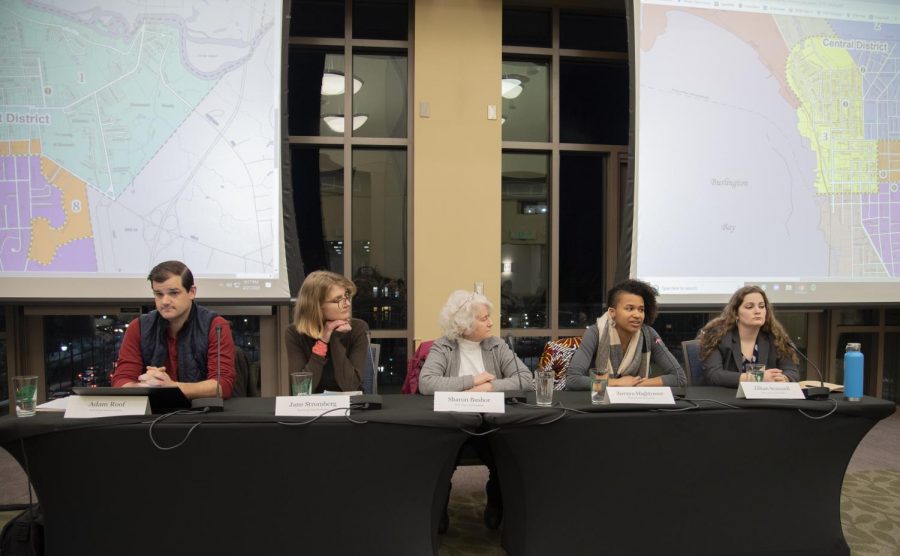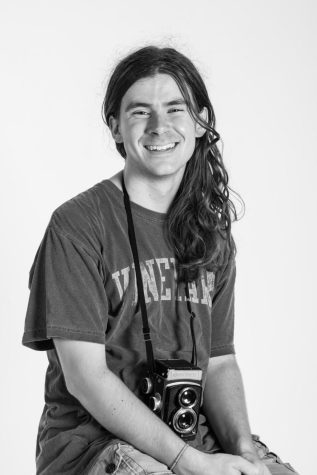Wards 1 and 8 candidates debate one last time
Ward 8 candidates Adam Roof and Jane Stromberg and Ward 1 candidates Sharon Bushor, Zoraya Hightower and Jillian Scannell gathered in the Livak Ballroom Feb. 27 for their last debate.
March 2, 2020
In the final days before election day, the city council candidates from Wards 1 and 8 gathered at UVM to make their voices heard to potential student voters.
On Feb. 27, Ward 1 candidates Sharon Bushor, Zoraya Hightower and SGA President Jillian Scannell, a senior, and Ward 8 candidates Adam Roof and Jane Stromberg gathered in the Davis Center’s Livak Ballroom for one last debate, hosted by SGA and the Vermont Cynic.
The issue that took up the most time at the debate was climate change and its effect on UVM and Burlington.
Roof said one of his plans to cut back on the effects of climate change is “Plus One for Climate Action,” a plan that will add $1 to tickets sold for concerts and festivals on the Burlington Waterfront to fund alternative transportation systems without going to the taxpayers.
“Setting up taxes to fund transportation requires a far longer time to enact, mostly because it requires prior approval,” Roof said. “This plan is far more deployable and can start to generate funds more immediately.”
Recently, the city added two electric buses to its transportation system, which Roof said he was a part of.
Stromberg said she wants to establish a fare free system for all buses and implement more electric buses to the city’s arsenal.
Stromberg also said Roof was not an integral part of implementing two electric buses in Burlington’s transportation system as he and his campaign have said.
“Adam Roof did not do anything to implement the buses,” she said. “He was only at an announcement event. Those two buses were put forth by Burlington Electric Department, who actually did the grunt work, and Green Mountain Transit.”
However, Roof said not only did he work with various groups and people to implement the buses, but also that Stromberg did not answer the question.
“With all due respect, I don’t think you answered the question there,” he said. “The question was about the concrete plans you would do, not judging the work that I’ve done.”
As for Lake Champlain water quality issues, Bushor said work to begin cleaning up the lake has already begun. Though the cost to implement solutions is significant, the city council is looking for ways to increase affordability, she said.
“The council is looking at a tiered water system so there’s a basic fee, and if you use above a certain amount of water you pay extra,” she said. “The point of this is to make water affordable for everyone.”
Hightower said public outreach is important in making sure the community is aware of water safety issues, along with adding upgrades to infrastructure.
“There’s an education piece that city council has to do around water responsibilities on both sides of the lake,” she said. “And we have to be willing to pay for upgrades for water infrastructure, which is in the works in a way that is very progressive.”
Living in the city of Burlington should mean all people have access to clean water, but many members of the community go without, Scannell said.
“Why is it that the University is the only entity with clean water during the boil water advisory?” she said. “There’s a big injustice piece.”
Housing, especially on the University’s campus, was another topic of debate. Scannell said she would make sure UVM is held accountable for not having enough on-campus housing for a growing student body.
“We’re still stretched very tight in terms of finances,” Scannell said. “I want to bring the city and the University together to move forward from the past and have that productive conversation.”
All candidates in Ward 1 agreed that fostering the relationship between students and permanent residents off campus was important.
However, Scannell and Hightower both said that students are not the problem when it comes to community discourse.
“Having students and long-term residents live next to each other doesn’t inherently mean that there’s going to be conflict,” Scannell said. “There are times where students are awful and they keep you and your kids up all night and they leave beer cans out, but I don’t like when the city vilifies students.”
For Hightower, it’s not just about students and long-term residents, but all short-term residents, including minorities.
“Some of the long-term residents feel like they’re losing their housing, but most of the residents I’ve talked to want diversity, they want students,” Hightower said. “People feel like the quality of housing is deteriorating, but it’s not a student problem. It’s about tenant’s rights.”
Bushor said it’s less about students and long-term residents, but owners and investors.
“When an investor buys a house and fills it with renters, that’s when conflicts happen,” she said. “It erodes the stability of certain neighborhoods. People want balance. They enjoy the diversity.”
Candidates also discussed how city council will make sure student voices will be heard in local politics. All five councilors said they will support students and other community members.








